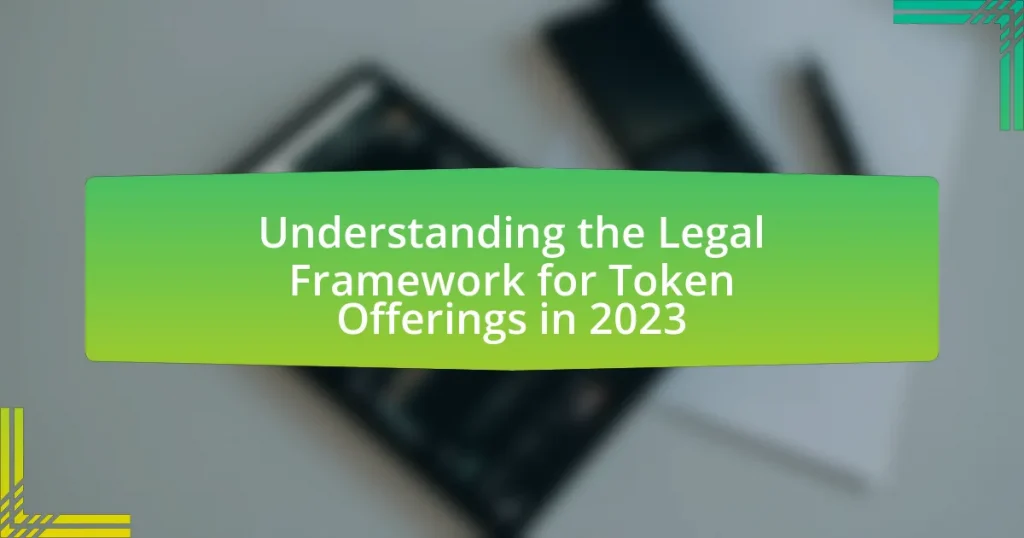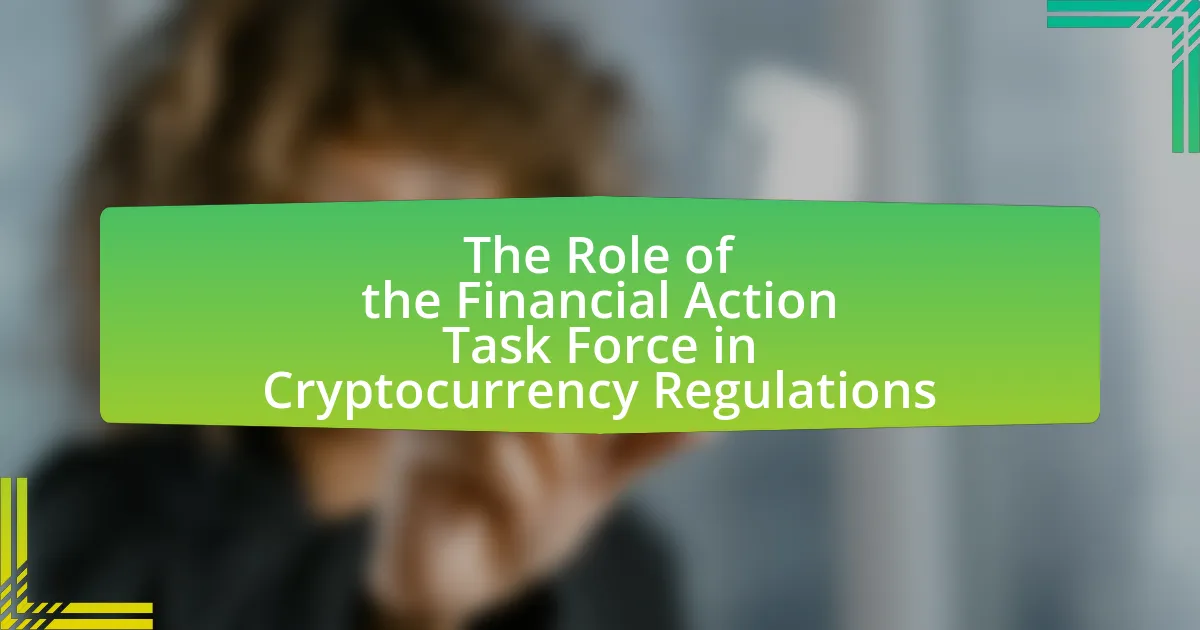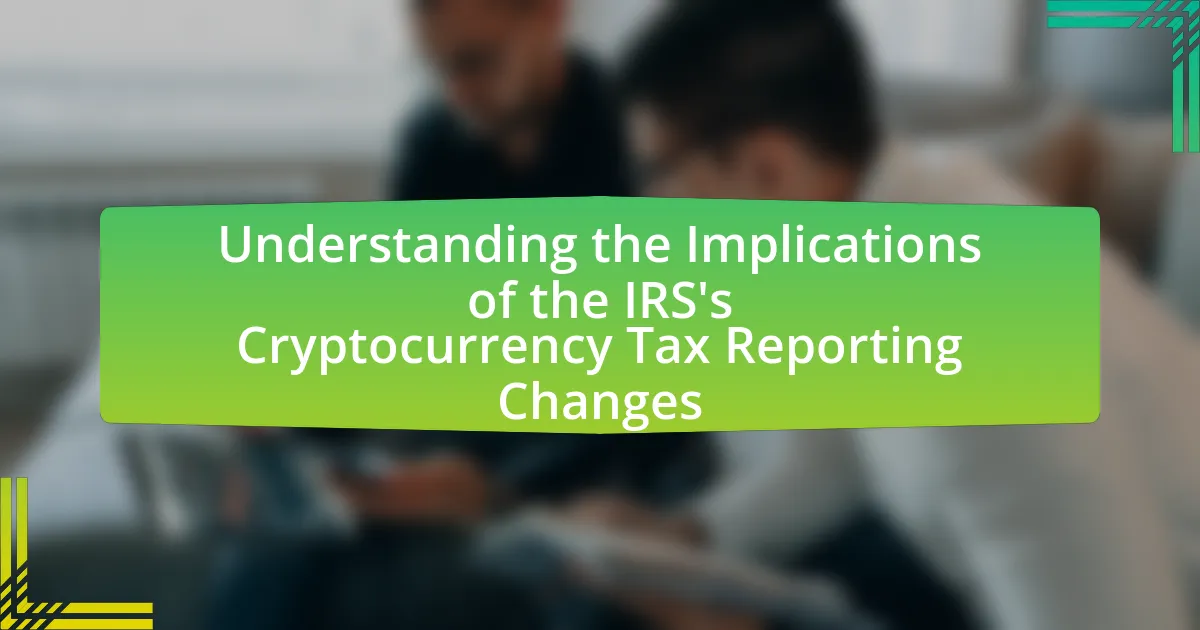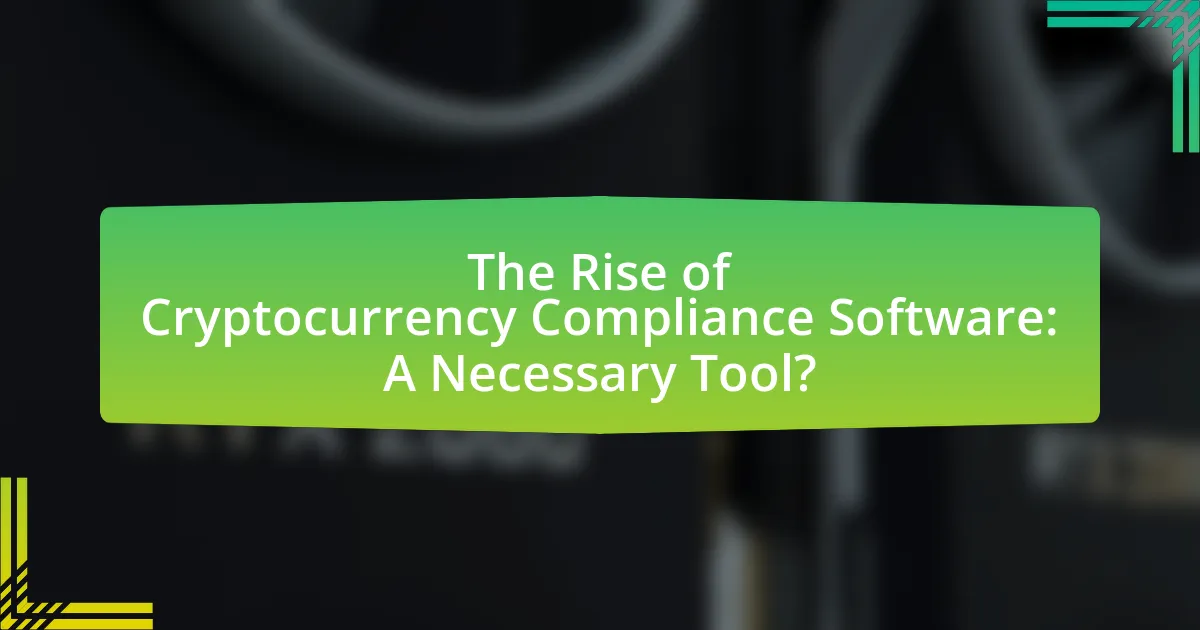The main entity of the article is the legal framework governing token offerings in 2023. The article outlines how token offerings, including Initial Coin Offerings (ICOs) and Security Token Offerings (STOs), are regulated primarily by securities laws, anti-money laundering regulations, and consumer protection laws across various jurisdictions. It discusses the implications of these regulations, the importance of compliance for participants, and the risks associated with non-compliance. Additionally, the article highlights the distinctions between utility and security tokens, the evolving regulatory landscape, and best practices for ensuring legal compliance in token offerings.
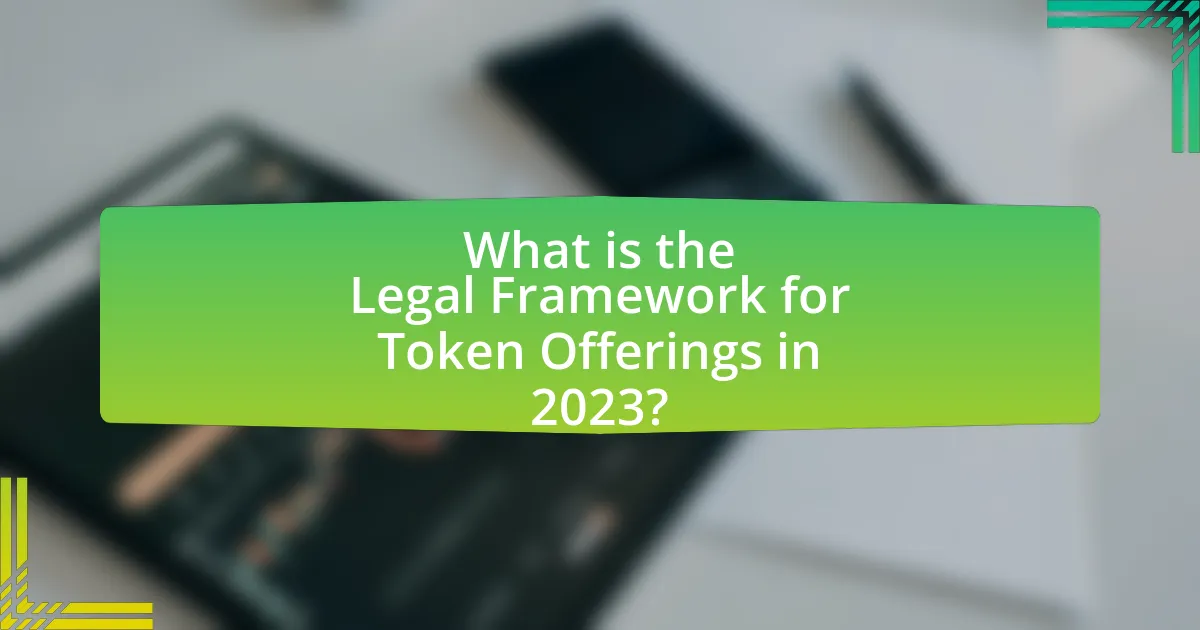
What is the Legal Framework for Token Offerings in 2023?
The legal framework for token offerings in 2023 is primarily governed by securities laws, anti-money laundering regulations, and consumer protection laws. In many jurisdictions, tokens that qualify as securities must be registered with regulatory bodies, such as the U.S. Securities and Exchange Commission (SEC), which has provided guidance indicating that many tokens fall under the definition of securities based on the Howey Test. Additionally, compliance with the Financial Action Task Force (FATF) guidelines is essential for anti-money laundering measures. Countries like the European Union have also introduced the Markets in Crypto-Assets (MiCA) regulation, which aims to create a comprehensive regulatory framework for crypto-assets, including token offerings. These regulations are designed to protect investors and ensure market integrity while fostering innovation in the blockchain space.
How do token offerings fit into the broader financial regulatory landscape?
Token offerings, including Initial Coin Offerings (ICOs) and Security Token Offerings (STOs), are increasingly subject to financial regulations that aim to protect investors and ensure market integrity. Regulatory bodies, such as the U.S. Securities and Exchange Commission (SEC), classify many token offerings as securities, requiring compliance with existing securities laws, which include registration and disclosure obligations. For instance, the SEC’s 2019 framework clarified that tokens meeting the Howey Test criteria are considered securities, thus mandating adherence to regulatory standards. This regulatory scrutiny aims to mitigate risks associated with fraud and market manipulation, aligning token offerings with traditional financial instruments within the broader regulatory landscape.
What are the key regulations governing token offerings?
The key regulations governing token offerings primarily include securities laws, anti-money laundering (AML) regulations, and consumer protection laws. In the United States, the Securities and Exchange Commission (SEC) determines whether a token is classified as a security under the Howey Test, which assesses whether an investment contract exists based on the expectation of profits derived from the efforts of others. Additionally, token offerings must comply with the Bank Secrecy Act (BSA) and AML regulations to prevent illicit activities. In Europe, the Markets in Crypto-Assets (MiCA) regulation aims to provide a comprehensive framework for crypto-assets, ensuring investor protection and market integrity. These regulations are essential for maintaining legal compliance and protecting investors in the rapidly evolving landscape of token offerings.
How do these regulations differ across jurisdictions?
Regulations for token offerings differ significantly across jurisdictions, primarily due to varying legal definitions of securities and compliance requirements. For instance, in the United States, the Securities and Exchange Commission (SEC) classifies many tokens as securities under the Howey Test, necessitating registration and adherence to strict disclosure requirements. Conversely, in Switzerland, the Financial Market Supervisory Authority (FINMA) has a more flexible approach, allowing certain tokens to be classified as utility tokens, which may not require the same level of regulatory scrutiny. Additionally, jurisdictions like Singapore have established a clear framework through the Monetary Authority of Singapore (MAS), which provides guidelines for token offerings while promoting innovation. These differences reflect each jurisdiction’s regulatory philosophy and approach to fostering or restricting the growth of the token economy.
Why is understanding the legal framework important for participants?
Understanding the legal framework is crucial for participants because it ensures compliance with regulations, thereby minimizing legal risks. Participants who grasp the legal landscape can navigate token offerings effectively, avoiding potential penalties or legal disputes. For instance, the U.S. Securities and Exchange Commission (SEC) has specific guidelines regarding the classification of tokens, which can determine whether they are considered securities. Failure to comply with these regulations can lead to significant financial repercussions and damage to reputation. Therefore, a solid understanding of the legal framework empowers participants to make informed decisions and engage in token offerings responsibly.
What risks do participants face without legal compliance?
Participants face significant risks without legal compliance, including financial penalties, legal liabilities, and potential criminal charges. Non-compliance can lead to regulatory actions from authorities, resulting in fines that can reach millions of dollars, as seen in cases involving unregistered securities offerings. Additionally, participants may face lawsuits from investors seeking restitution for losses incurred due to non-compliance, which can further escalate financial risks. Furthermore, engaging in non-compliant activities can damage reputations, leading to loss of trust and future business opportunities. These risks underscore the importance of adhering to legal frameworks governing token offerings to mitigate potential negative consequences.
How can legal knowledge enhance investor confidence?
Legal knowledge enhances investor confidence by providing clarity and assurance regarding the regulatory environment surrounding investments. When investors understand the legal framework, they can better assess the risks and protections associated with their investments, leading to informed decision-making. For instance, knowledge of securities laws and compliance requirements can help investors identify legitimate token offerings, reducing the likelihood of fraud. According to a report by the World Economic Forum, clear regulatory guidelines can increase market participation by up to 30%, demonstrating that legal knowledge directly correlates with heightened investor trust and engagement in the market.
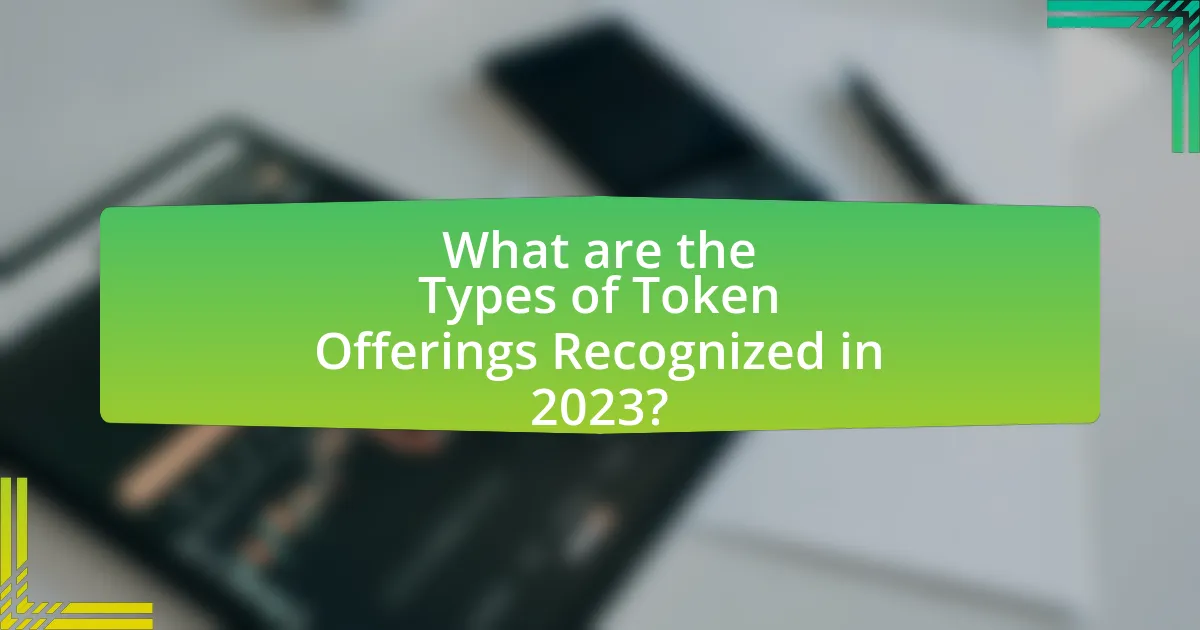
What are the Types of Token Offerings Recognized in 2023?
In 2023, the recognized types of token offerings include Initial Coin Offerings (ICOs), Security Token Offerings (STOs), and Initial Exchange Offerings (IEOs). ICOs allow projects to raise funds by issuing tokens that may represent utility or access to a service, while STOs involve the issuance of tokens that are classified as securities, providing investors with ownership rights. IEOs are conducted on cryptocurrency exchanges, where the exchange acts as an intermediary, enhancing trust and regulatory compliance. These classifications are essential for understanding the legal framework governing token offerings, as they determine the regulatory requirements and investor protections applicable to each type.
What distinguishes utility tokens from security tokens?
Utility tokens are primarily designed to provide access to a product or service within a specific ecosystem, while security tokens represent ownership or investment in an asset and are subject to regulatory oversight. The distinction lies in their intended use; utility tokens facilitate transactions and access, whereas security tokens are investment vehicles that confer rights to dividends or profit sharing. For example, the U.S. Securities and Exchange Commission (SEC) classifies tokens as securities if they meet the Howey Test criteria, which assesses whether an investment of money is made in a common enterprise with an expectation of profits derived from the efforts of others. This regulatory framework underscores the legal implications and investor protections associated with security tokens, contrasting with the more flexible nature of utility tokens.
How are utility tokens regulated compared to security tokens?
Utility tokens are generally regulated less stringently than security tokens. Security tokens are classified as securities and are subject to comprehensive regulations under securities laws, requiring registration with regulatory bodies like the SEC in the United States. In contrast, utility tokens are often considered as tools for accessing a service or product within a specific ecosystem and may not fall under the same regulatory framework, provided they do not meet the criteria of an investment contract as defined by the Howey Test. This distinction is supported by the SEC’s guidance, which emphasizes that the regulatory treatment of tokens depends on their intended use and the expectations of purchasers.
What are the implications of misclassifying a token?
Misclassifying a token can lead to significant legal and financial repercussions. When a token is incorrectly classified, it may be treated as a security when it is not, resulting in non-compliance with securities regulations, which can incur penalties, fines, or legal action from regulatory bodies such as the SEC. For instance, the SEC has enforced actions against companies for failing to register tokens as securities, leading to costly settlements and reputational damage. Additionally, misclassification can mislead investors regarding the risks and rights associated with the token, potentially resulting in financial losses and loss of trust in the issuing entity.
What role do Initial Coin Offerings (ICOs) play in the token offering landscape?
Initial Coin Offerings (ICOs) serve as a fundraising mechanism for blockchain projects, allowing them to issue tokens to investors in exchange for capital. ICOs enable startups to bypass traditional funding routes, providing access to a global pool of investors and facilitating the rapid development of innovative technologies. In 2017, ICOs raised over $5.6 billion, demonstrating their significant impact on the token offering landscape. This method has also prompted regulatory scrutiny, leading to the establishment of legal frameworks aimed at protecting investors and ensuring compliance, as seen in various jurisdictions implementing guidelines for token sales.
How have ICO regulations evolved in 2023?
In 2023, ICO regulations have evolved significantly, with many countries implementing stricter compliance measures to enhance investor protection and reduce fraud. For instance, the European Union introduced the Markets in Crypto-Assets (MiCA) regulation, which establishes a comprehensive framework for crypto-assets, including ICOs, requiring issuers to provide detailed whitepapers and adhere to transparency standards. Additionally, the U.S. Securities and Exchange Commission (SEC) has intensified its scrutiny of ICOs, emphasizing that many tokens qualify as securities and thus must comply with existing securities laws. These regulatory changes reflect a global trend towards greater oversight and standardization in the ICO landscape, aiming to foster a safer investment environment.
What are the common pitfalls in ICO compliance?
Common pitfalls in ICO compliance include inadequate regulatory understanding, failure to conduct proper due diligence, and lack of transparency in token utility. Many ICOs misinterpret the legal status of their tokens, often assuming they are not securities when they may be classified as such under regulations like the Howey Test. This misclassification can lead to significant legal repercussions, including fines and shutdowns. Additionally, insufficient due diligence on investors can result in non-compliance with anti-money laundering (AML) and know your customer (KYC) regulations, exposing the ICO to legal risks. Lastly, a lack of clear communication regarding the token’s purpose and functionality can mislead investors, leading to potential fraud allegations and loss of trust.
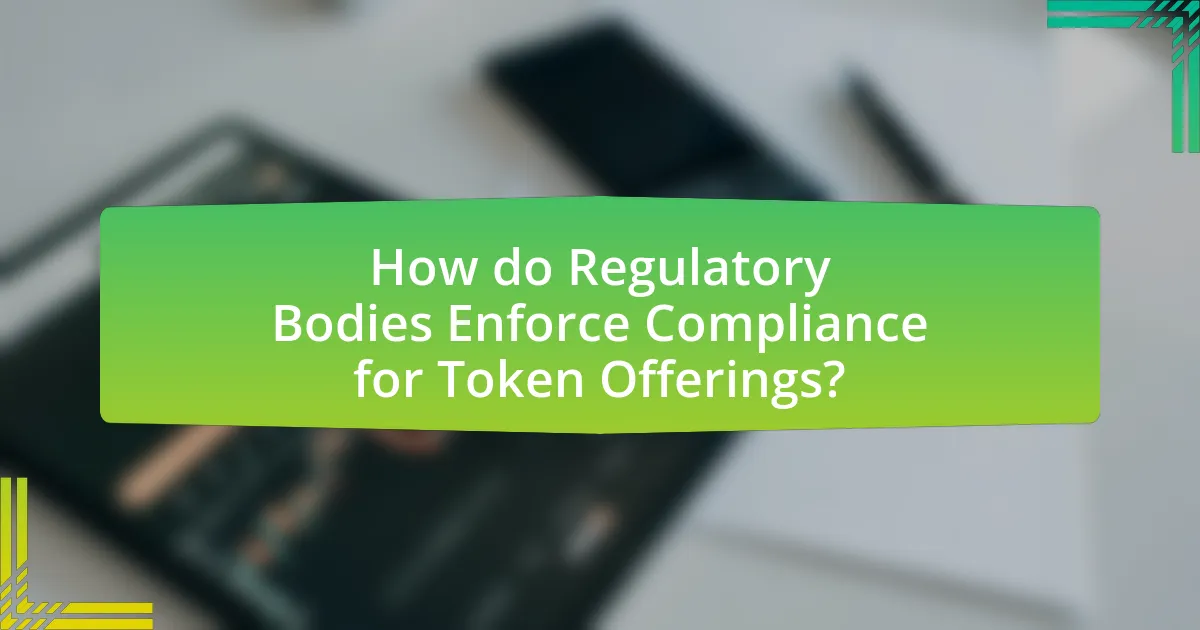
How do Regulatory Bodies Enforce Compliance for Token Offerings?
Regulatory bodies enforce compliance for token offerings primarily through the implementation of legal frameworks that require adherence to securities laws. These bodies, such as the U.S. Securities and Exchange Commission (SEC), assess whether a token qualifies as a security under the Howey Test, which evaluates investment contracts based on the expectation of profits derived from the efforts of others.
To ensure compliance, regulatory bodies conduct investigations, require registration of token offerings, and impose penalties for violations. For instance, in 2021, the SEC charged several companies for conducting unregistered securities offerings, highlighting their active role in monitoring and enforcing compliance. Additionally, regulatory bodies may issue guidelines and advisories to clarify the legal obligations of token issuers, thereby promoting transparency and protecting investors.
What are the primary regulatory bodies involved in token offerings?
The primary regulatory bodies involved in token offerings include the U.S. Securities and Exchange Commission (SEC), the Commodity Futures Trading Commission (CFTC), and the Financial Industry Regulatory Authority (FINRA). The SEC oversees securities laws and determines whether a token qualifies as a security, while the CFTC regulates commodities and derivatives, which can include certain tokens. FINRA, as a self-regulatory organization, provides oversight for broker-dealers involved in token offerings. These bodies ensure compliance with financial regulations to protect investors and maintain market integrity.
How do these bodies assess compliance and enforce regulations?
Regulatory bodies assess compliance and enforce regulations through a combination of audits, inspections, and reporting requirements. These entities, such as the Securities and Exchange Commission (SEC) in the United States, utilize systematic reviews of financial statements, transaction records, and operational practices to ensure adherence to established laws. For instance, the SEC mandates regular disclosures from companies involved in token offerings, which allows for ongoing monitoring of compliance with securities laws. Additionally, these bodies can impose penalties, initiate investigations, and take legal action against entities that violate regulations, thereby reinforcing compliance through enforcement mechanisms.
What penalties can be imposed for non-compliance?
Penalties for non-compliance with regulations governing token offerings can include fines, sanctions, and legal action. Regulatory bodies, such as the Securities and Exchange Commission (SEC) in the United States, may impose financial penalties that can reach millions of dollars depending on the severity of the violation. Additionally, non-compliant entities may face restrictions on their ability to conduct future token offerings or may be required to return funds raised from investors. Legal action can also result in criminal charges against individuals involved in fraudulent activities, leading to imprisonment. These penalties are designed to enforce compliance and protect investors in the evolving landscape of token offerings.
How do legal frameworks adapt to technological advancements in token offerings?
Legal frameworks adapt to technological advancements in token offerings by evolving regulations that address the unique characteristics of digital assets. Regulatory bodies, such as the U.S. Securities and Exchange Commission (SEC), have updated guidelines to classify tokens based on their functionality, distinguishing between utility tokens and security tokens. For instance, the SEC’s Framework for “Investment Contract” Analysis of Digital Assets provides a clear methodology for determining whether a token is a security, thus ensuring compliance with existing securities laws. Additionally, jurisdictions like Switzerland and Singapore have implemented specific legal structures, such as the Financial Market Supervisory Authority (FINMA) guidelines and the Monetary Authority of Singapore’s (MAS) regulatory sandbox, to foster innovation while maintaining investor protection. These adaptations demonstrate a proactive approach to integrating technological advancements within established legal frameworks, ensuring that regulations remain relevant and effective in the rapidly evolving landscape of token offerings.
What emerging technologies are influencing regulatory approaches?
Emerging technologies influencing regulatory approaches include blockchain, artificial intelligence, and machine learning. Blockchain technology is reshaping regulatory frameworks by providing transparency and traceability in transactions, which is crucial for compliance in token offerings. Artificial intelligence enhances regulatory oversight by enabling predictive analytics and risk assessment, allowing regulators to identify potential violations more effectively. Machine learning algorithms assist in automating compliance processes, reducing the burden on businesses while ensuring adherence to regulations. These technologies are increasingly being integrated into regulatory practices to adapt to the evolving landscape of digital assets and token offerings.
How can participants stay informed about regulatory changes?
Participants can stay informed about regulatory changes by subscribing to updates from relevant regulatory bodies, such as the Securities and Exchange Commission (SEC) or the Financial Conduct Authority (FCA). These organizations regularly publish news releases, guidelines, and updates on their websites, which provide essential information regarding changes in regulations. Additionally, participants can follow industry news through reputable financial news outlets and join professional associations that focus on regulatory compliance, as these sources often analyze and disseminate information about new regulations affecting token offerings.
What Best Practices Should Participants Follow for Legal Compliance?
Participants should adhere to the following best practices for legal compliance in token offerings: conduct thorough due diligence on applicable regulations, ensure proper registration of tokens with relevant authorities, and implement robust anti-money laundering (AML) and know your customer (KYC) procedures. These practices are essential as they help mitigate legal risks and align with regulatory expectations. For instance, the U.S. Securities and Exchange Commission (SEC) mandates that certain token offerings qualify as securities, requiring registration or an exemption. Additionally, compliance with AML and KYC regulations is critical, as failure to adhere can result in significant penalties and legal repercussions.
How can participants ensure their token offerings meet legal standards?
Participants can ensure their token offerings meet legal standards by conducting thorough legal compliance assessments and adhering to relevant regulations. This involves consulting with legal experts who specialize in securities law and cryptocurrency regulations, as well as registering the token offering with appropriate regulatory bodies, such as the Securities and Exchange Commission in the United States, if the tokens are classified as securities. Additionally, participants should implement robust anti-money laundering (AML) and know your customer (KYC) procedures to mitigate legal risks. Compliance with the Financial Action Task Force (FATF) guidelines can further enhance the legitimacy of the offering.
What resources are available for understanding token offering regulations?
Resources available for understanding token offering regulations include government websites, legal publications, and industry reports. Government websites, such as the U.S. Securities and Exchange Commission (SEC), provide official guidelines and regulatory updates on token offerings. Legal publications, like the “Harvard Law School Forum on Corporate Governance,” offer analyses and interpretations of existing laws. Additionally, industry reports from organizations such as the Blockchain Association and the International Organization of Securities Commissions (IOSCO) present insights into market practices and regulatory trends. These resources collectively help stakeholders navigate the complex legal landscape surrounding token offerings.
